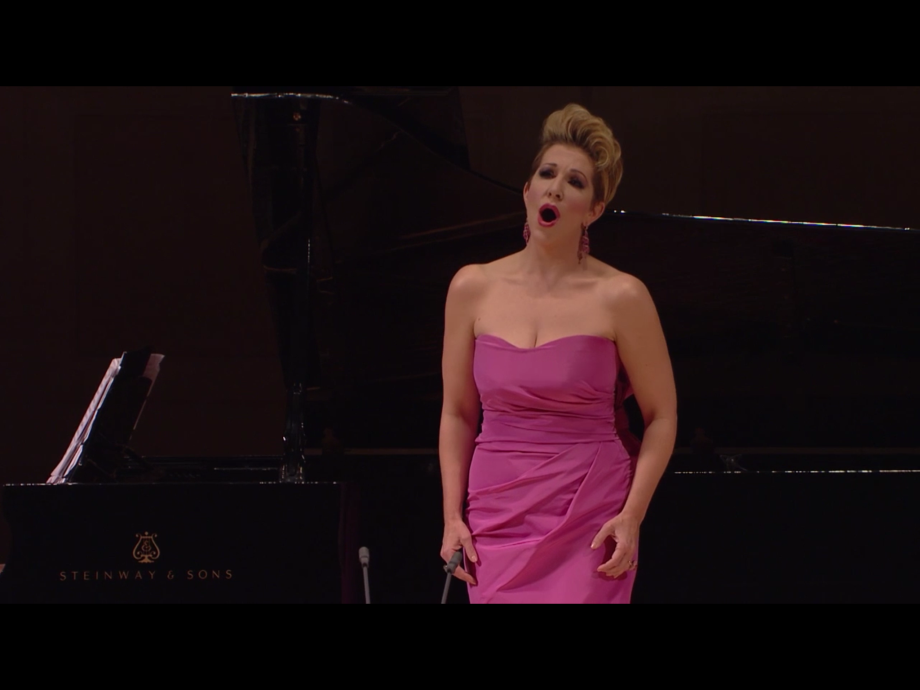In my case, watching Joyce DiDonato’s recent Carnegie Hall recital on medici.tv. I really like this live broadcast/archive thing that Carnegie Hall has started doing – it’s free to watch, for one thing (yay!) and it’s a bit of concert stress insurance: if they do this for the concerts I really reallycare about, I know that if something weird happens and I don’t make it to New York, I can still hear them.
There was a mild technical problem with the audio/video synch when I was watching this. The video was a few seconds ahead for most of the second half. Not a big deal, but mildly irritating (I was watching it on my iPad, which may or may not have made a difference).
No subtitles either, though the website has a list of the pieces and may or may not have the texts – I didn’t check, because I found I was interested enough in the music that I didn’t need to worry about the words I didn’t catch. Some of this material I had heard many times before, like the willow song from Rossini’s version of Othello, and several of the pieces are on a CD I have of a live recording of DiDonato giving a similar recital in London a few years ago. I will also agree with the New York times critic who notes that DiDonato’s singing is far more interesting than what she says when she pauses to talk about the music.
And what is it about Fauré songs? The past two or three reviews I have read of mezzos and sopranos who are not French singing Fauré have noted that the singer’s French diction is iffy. Is French really so much more difficult than English or German or Italian to get right? Perhaps the French have tricked us into thinking so. Certainly I never hear anyone say “his German is very . . . French” the way people say “her French is very . . . English.” Or maybe the “his/her French diction is bad” is a criticism that one can always make because no one is going to go out on a limb and defend the French of a non-French speaker. Or perhaps it is really the case that all of my favorite singers (except Natalie Dessay and Patricia Petibon for obvious reasons) are bad at French. Fair enough, I suppose. I can live with that.

I think French is hard! I was really struck a couple of weekends ago listening to a local singer. His German and English diction was impeccable but the French not so much! I don’t think English is necessarily easy either. Try listening to the La Scala chorus mangling Peter Grimes!
LikeLike
I remember listening to Magdalena Kozena singing something in English once and thinking that intellectually, I knew that this was English, but I could only understand about half of it. English vowels are not for the faint of heart.
LikeLike
‘Certainly I never hear anyone say “his German is very… French” the way people say “her French is very… English.”’
I guess it has just a lot to do with what your native language is. Of course you get nervous when someone mangles your own everyday language, and you will also probably notice when someone tries to sing in a foreign tongue with an English accent. On the other hand, complaining that XYZ’s Italian is really kinda Norwegian-sounding is a bit risky.
I guess there a people who mind more or less about accents. Personally, I get rather fidgety when it comes to my own, but am much more tolerant about others. E.g. I simply cannot listen to Plácido Domingo trying to sing in German, and though I like Ian Bostridge a lot, his Oxford German sometimes ruins his Schubert for me. On the other hand, one of the pleasures of listening to Thomas Hampson has always been to simply marvel at how effortlessly natural his German sounds (whether he sings or speaks it). Ah yes, the quirks of fandom…
LikeLike
Accents in sung English used to bother me more in the past than they do now – not surr why this is the case. On the other hand, English-language song/opera makes up a very small part of what I habitually listen to; I might feel diffently if my first language was Italian or German!
LikeLike
English language rep is a very large proportion of what I listen to. After all, a huge proportion of contemporary work is in English.
LikeLike
True – do you find you get more or less picky about diction over time, or does it matter in some cases more than others?
LikeLike
I do think it matters in some things more than others. Clarity of diction is crucial in art song and I’m addicted to English art song. It’s hard too to ignore the performance tradition around Britten’s works in which clarity of diction is such an important element. Maybe I’m not so fussy about Adams or Heggie. Not sure really.
LikeLike